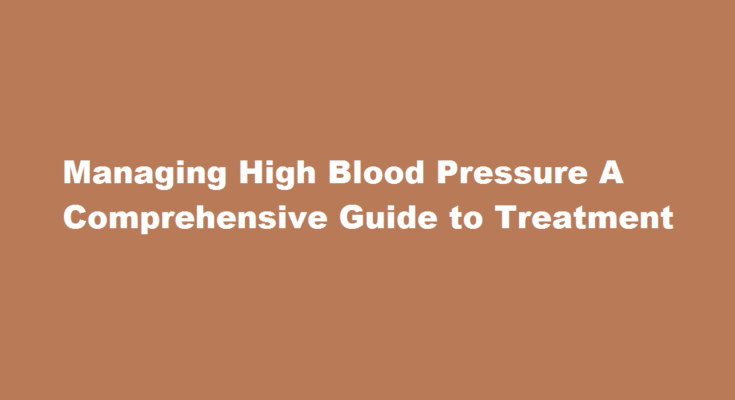Introduction
High blood pressure, also known as hypertension, is a common medical condition that affects millions of people worldwide. It is a serious health concern and a significant risk factor for heart disease, stroke, and other complications. Fortunately, high blood pressure can be effectively managed through a combination of lifestyle modifications and medical interventions. This article aims to provide a unique and informative guide on how to treat high blood pressure, highlighting various strategies that individuals can adopt to control their blood pressure and lead a healthier life.
Understand Your Blood Pressure
To effectively manage high blood pressure, it’s crucial to understand what it means. Blood pressure is measured in millimeters of mercury (mmHg) and is represented by two numbers: systolic pressure (the top number) and diastolic pressure (the bottom number). A healthy blood pressure reading is typically around 120/80 mmHg. Elevated blood pressure (prehypertension) falls between 120-139/80-89 mmHg, while hypertension is defined as blood pressure consistently exceeding 140/90 mmHg. Consult a healthcare professional to accurately determine your blood pressure level and understand the severity of your condition.
Lifestyle Modification
Lifestyle changes play a pivotal role in managing high blood pressure. These modifications include
- Healthy Eating Adopt a balanced diet rich in fruits, vegetables, whole grains, lean proteins, and low-fat dairy products. Reduce sodium (salt) intake, limit processed foods, and avoid excessive alcohol consumption.
- Regular Exercise Engage in regular physical activity, aiming for at least 150 minutes of moderate-intensity aerobic exercise per week. Activities like brisk walking, cycling, or swimming can help lower blood pressure.
- Weight Management Maintain a healthy weight or strive towards achieving it through a combination of diet and exercise. Shedding excess pounds can significantly reduce blood pressure levels.
- Stress Reduction Practice stress-management techniques such as deep breathing exercises, meditation, yoga, or engaging in hobbies to help alleviate anxiety and reduce blood pressure.
Medications and Medical Interventions
In some cases, lifestyle modifications alone may not be sufficient to control high blood pressure. Physicians may prescribe medications to complement lifestyle changes. Common medications include
- Diuretics Help eliminate excess fluid and sodium from the body, reducing blood volume.
- ACE Inhibitors and ARBs Relax blood vessels and lower blood pressure by blocking certain chemicals in the body.
- Beta-blockers Reduce heart rate and the force of contractions, thus lowering blood pressure.
- Calcium Channel Blockers Prevent calcium from entering the heart muscles and blood vessel walls, relaxing and widening the vessels.
It is essential to consult a healthcare professional to determine the most appropriate medication and dosage for individual cases. Regular check-ups and adherence to prescribed treatments are crucial for effective blood pressure management.
Monitoring and Self-Care
Regular monitoring of blood pressure is crucial to ensure it remains within a healthy range. Home blood pressure monitors are available, allowing individuals to track their readings and identify any fluctuations. Self-care practices such as maintaining a healthy lifestyle, managing stress, and avoiding tobacco products can contribute to long-term blood pressure control.
Frequently Asked Questions
What is the most common BP medication?
Specifically, the most commonly prescribed blood pressure medications are the ACE inhibitor lisinopril (Prinivil and Zestril), the DHP calcium channel blocker amlodipine (Norvasc), the beta-blocker metoprolol (Lopressor), and the thiazide diuretic hydrochlorothiazide.
What is the main cause of high blood pressure?
High blood pressure usually develops over time. It can happen because of unhealthy lifestyle choices, such as not getting enough regular physical activity. Certain health conditions, such as diabetes and obesity, can also increase the risk for developing high blood pressure.
Conclusion
High blood pressure is a significant health concern, but with the right approach, it can be effectively managed. By adopting lifestyle modifications, including a healthy diet, regular exercise, weight management, and stress reduction, individuals can significantly reduce their blood pressure levels. Additionally, medical interventions, when prescribed by healthcare professionals, can further aid in blood pressure control. Remember to monitor blood pressure regularly and communicate openly with your healthcare provider to ensure personalized and effective treatment. Taking charge of your health and prioritizing blood pressure management will help you lead a healthier and more fulfilling life.
Read Also : Managing Low Blood Pressure Effective Treatment and Lifestyle Strategies



